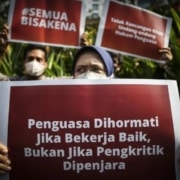
Anies Baswedan announced Muhaimin Iskandar as his running mate on Saturday, 2 September. Photo by Moch Asim and Tom for Antara.
Indonesian has never been a stranger to intriguing political alliances, but the Anies Baswedan-Muhaimin Iskandar candidacy for the upcoming 2024 presidential election might be one of the most fascinating.
Their ticket is backed by an unlikely coalition – including the National Awakening Party, the National Democratic Party (Nasdem) and the Prosperous Justice Party (PKS) – that stitches together a disparate patchwork of ideological and religious interests.
On the surface, the partnership bridges the modernist and traditionalist Islamic ideologies, but beneath the surface there are signs of more complex political manoeuvring.
An unstable union
Muhaimin “Cak Imin” Iskandar, the deputy house speaker, first rose to prominence through his association with Indonesia’s popular fourth president, Abdurrahman “Gus Dur” Wahid. He is the chair of PKB, the party most closely associated with NU, Indonesia’s largest and most influential religious organisation.
Securing Cak Imin as a running mate is a bold move for Baswedan. Not only does it offer the chance to consolidate the Muslim vote, it also steals support from key rival Prabowo Subianto, who previously pledged to let Cak Imin chose his running mate.
But even so, the outlook for Anies remains bleak. Recent survey data from Lembaga Survei Indonesia (LSI) ranked Cak Imin as the sixth most popular running mate for Anies, with an approval rating of 2.6% – well behind Agus Harimurti Yudhoyono, leading at 22% approval, and Sandiaga Uno, at 21.4%.
With Anies drawing support from the Muslim modernists, and Cak Imin backed by Muslim traditionalists, this low approval rating likely speaks to the ideological incompatibility of their respective supporter bases.
It’s therefore worth asking whether this political arrangement would be sustainable beyond the elections, given the ideological difference it attempts to bridge is deeply rooted in conflicting interpretations of religious and social norms.
The pairing raises obvious questions about Indonesia’s religious and foreign policies. For example, a pivot towards Saudi Arabia would appeal to the modernist camp but displease the more traditionalist elements within the NU community.
Another fault line emerges on matters of social justice. While PKS has a history of stringent conservatism on matters of gender equality, NU has shown some flexibility. For example, last year, the PKB members of parliament approved a bill on sexual violence, while PKS members opposed the bill because it did not outlaw sex outside of marriage.
A failure to effectively manage these inherent ideological contradictions, could spell the end of this alliance. And beyond a mere electoral defeat, it could also serve as an indictment of the idea that modernist and traditionalist Islamic ideologies can cohabit in a unified political space.
Splitting the NU vote
A coalition serving both the traditionalist and modernist supporter bases walks a perilous tightrope. Any perceived bias toward one ideological leaning risks alienating the other.
This raises another important question – what if another presidential candidate secures an NU affiliated running mate?
Cak Imin currently enjoys robust support from the Nahdliyin – affiliates of NU. His party, PKB, typically counts on the Nahdliyin for support in legislative elections but it’s not a given that this backing will automatically extend to a vice-presidential campaign.
That is because, unlike the 2019 election, Cak Imin has not yet secured an endorsement from the executive board of NU (PBNU). PBNU’s Chairman, Yahya Cholil Staquf, has stressed that no presidential or vice-presidential candidate will officially represent NU or receive official support from the kyai – NU clerics.
And since Cak Imin’s defection, Prabowo has begun talks with Yenny Wahid, the daughter of former president and PKB founder Gus Dur.
If another NU-affiliated candidate emerges, the ideological incompatibility of the Anies-Muhaimin pairing would, in all likelihood, split the NU vote.
Going for broke
Does the Anies-Muhaimin candidacy reveal a mutual desperation to consolidate power? Or is it a carefully considered marriage of convenience?
Certainly, both figures risk isolating their supporter base by partnering with an ideological rival. And a poor electoral performance could have repercussions for both candidates’ future political careers.
But the latest survey results show Ganjar Pranowo leads with a 24.9% electability rate, just ahead of Prabowo Subianto on 24.6%, with Anies, well behind on just 12.7%. Perhaps it is time for Anies to take a risk?
If the election advances to a second round featuring only Ganjar and Prabowo, PKB’s endorsement will become more strategically significant. Essentially, the Anies-Muhaimin ticket could then become a bargaining chip, empowering PKB to negotiate more favorable terms for aligning with either of the two remaining contenders.
So, the Anies-Muhaimin ticket could end in a myriad of ways – a political masterstroke, a disastrous implosion, or just a steppingstone to greater bargaining power. It could redefine the game’s rules or become a case study of the pitfalls of ideological alliances. And even if the candidacy doesn’t result in electoral victory, it will underscore the complexities of Indonesian politics – an object lesson for coalition politics in ideologically polarised settings.
The only thing we can say for sure is the Anies-Muhaimin candidacy changes the political calculus for 2024.











